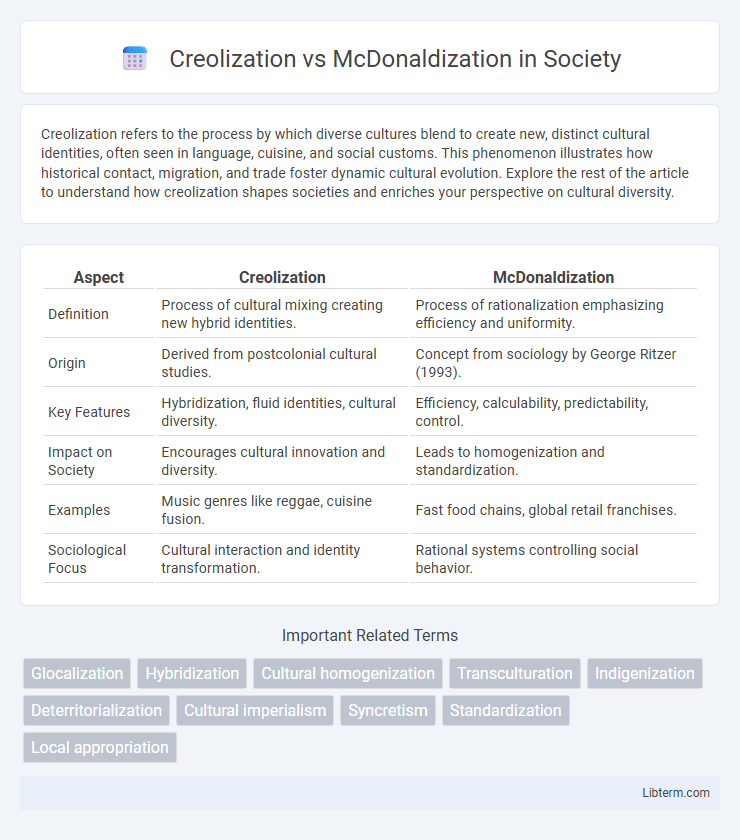Creolization refers to the process by which diverse cultures blend to create new, distinct cultural identities, often seen in language, cuisine, and social customs. This phenomenon illustrates how historical contact, migration, and trade foster dynamic cultural evolution. Explore the rest of the article to understand how creolization shapes societies and enriches your perspective on cultural diversity.
Table of Comparison
| Aspect | Creolization | McDonaldization |
|---|---|---|
| Definition | Process of cultural mixing creating new hybrid identities. | Process of rationalization emphasizing efficiency and uniformity. |
| Origin | Derived from postcolonial cultural studies. | Concept from sociology by George Ritzer (1993). |
| Key Features | Hybridization, fluid identities, cultural diversity. | Efficiency, calculability, predictability, control. |
| Impact on Society | Encourages cultural innovation and diversity. | Leads to homogenization and standardization. |
| Examples | Music genres like reggae, cuisine fusion. | Fast food chains, global retail franchises. |
| Sociological Focus | Cultural interaction and identity transformation. | Rational systems controlling social behavior. |
Understanding Creolization: A Cultural Fusion
Creolization describes the dynamic process where diverse cultural elements blend to form new, hybrid identities, emphasizing adaptation and mutual influence rather than dominance. This cultural fusion results in unique languages, traditions, and social practices that reflect the interconnectedness of different communities. Unlike McDonaldization, which promotes uniformity and efficiency, creolization highlights creativity, resilience, and the complex interplay of cultural diversity in contemporary societies.
McDonaldization Explained: The Global Spread of Uniformity
McDonaldization refers to the global phenomenon where principles of efficiency, calculability, predictability, and control dominate various sectors, leading to standardized products and services worldwide. This process results in cultural homogenization, as local customs and unique practices are replaced by uniform systems modeled after fast-food chains like McDonald's. The spread of McDonaldization accelerates globalization by promoting uniform consumer experiences but often diminishes cultural diversity and individuality.
Historical Roots of Creolization
Creolization traces its historical roots to the transatlantic slave trade, where diverse African, European, and Indigenous cultures merged under colonial conditions to create new, hybrid identities and languages. Unlike McDonaldization, which stems from modern principles of efficiency, calculability, and standardization in global consumer culture, creolization emphasizes cultural hybridity and resilience in contexts of oppression and displacement. The process illustrates how marginalized communities actively transform imposed cultural elements into unique, dynamic social practices over time.
Key Features of McDonaldization
McDonaldization is characterized by four key features: efficiency, calculability, predictability, and control. Efficiency emphasizes streamlined processes to achieve the quickest outcomes, while calculability focuses on quantifiable objectives such as size, cost, and speed. Predictability ensures uniform experiences across settings, and control leverages technology and standardized practices to minimize human variation.
Creolization and Identity Formation
Creolization fosters identity formation through the dynamic merging of diverse cultural elements, creating hybrid identities that resist homogenization. This process emphasizes fluidity and negotiation in cultural expressions, contrasting with McDonaldization's standardization and predictability model. By embracing complexity and multiplicity, Creolization supports the development of unique identities rooted in local contexts and global influences.
McDonaldization’s Impact on Local Cultures
McDonaldization leads to the globalization of standardized cultural practices, often diluting unique local customs through uniformity in consumer experiences and organizational efficiency. This process emphasizes predictability, calculability, and control, sometimes eroding indigenous traditions and cultural diversity by prioritizing mass production and consumption. As a result, local cultures may face homogenization, reducing cultural heterogeneity in favor of a globally recognizable, corporate-driven lifestyle.
Socioeconomic Implications of Creolization
Creolization fosters socioeconomic diversity by blending cultural identities, promoting innovation, and generating new market opportunities within global and local economies. It challenges rigid economic structures through hybrid social practices that support grassroots entrepreneurship and inclusive cultural exchanges. This process contributes to socioeconomic resilience by encouraging adaptability and collaboration across diverse communities.
Cultural Homogenization vs. Hybridization
Creolization emphasizes cultural hybridization, where diverse cultural elements blend to create new, unique cultural forms, countering cultural homogenization. McDonaldization describes the process of cultural homogenization through the spread of standardized, efficiency-driven global practices, often leading to uniformity in consumption and social behavior. While McDonaldization promotes cultural uniformity, creolization highlights dynamic cultural adaptation and diversity preservation in a globalized world.
Resistance and Adaptation in Globalization
Creolization represents resistance in globalization by blending diverse cultural elements into new, hybrid forms that challenge homogenizing forces, while McDonaldization exemplifies adaptation by standardizing local practices into efficient, uniform global processes. Creolization fosters cultural resilience through innovation and localized reinterpretations, contrasting with McDonaldization's emphasis on predictability, calculability, and control that often suppress local diversity. This dynamic highlights how societies negotiate globalization by either resisting cultural domination through creolized identities or adapting via the widespread adoption of McDonaldized systems.
Future Trends: Creolization or McDonaldization?
Future trends indicate a growing emphasis on creolization as globalization fosters cultural hybridization through digital communication and diverse social interactions. While McDonaldization emphasizes efficiency, predictability, and standardization, creolization promotes innovation, adaptability, and cultural blending. The increasing demand for personalized experiences and cultural authenticity suggests creolization will dominate future cultural and social dynamics more than uniform McDonaldization processes.
Creolization Infographic

 libterm.com
libterm.com